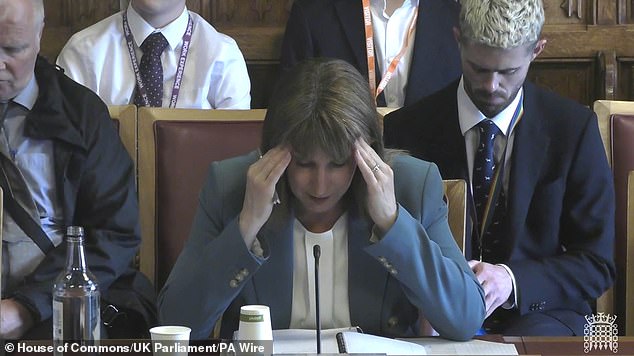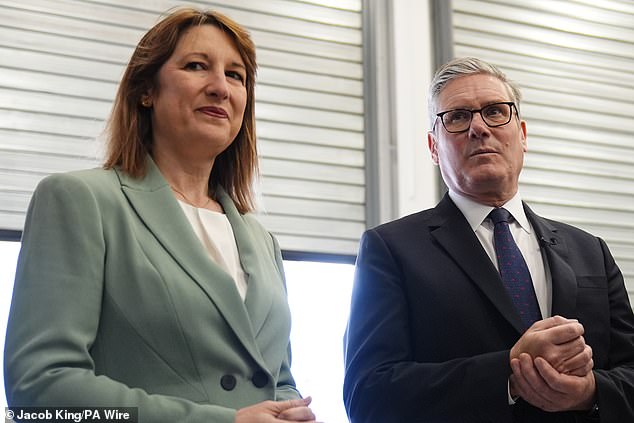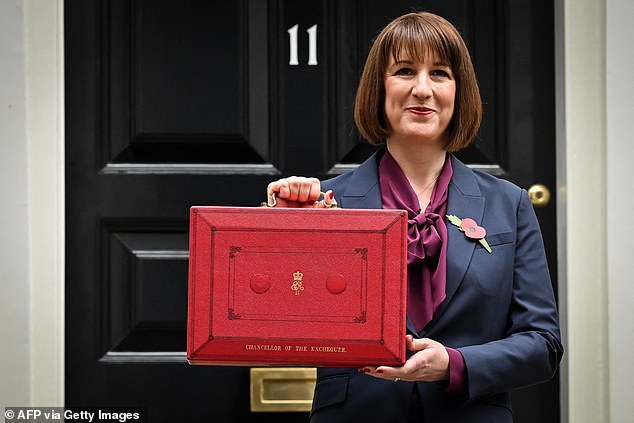After only a year of lacklustre Labour Government, Britain is broke. When you’re forced to borrow just to pay the interest on previous debts you’ve accumulated – which is what Keir Starmer and his miserable band of under-performing brothers and sisters are doing – there is really no other way to put it.
We’ll only borrow to invest and grow the economy, promised Labour during last summer’s election campaign. You can forget all that. The grim reality is that Labour is borrowing to meet the spiralling cost of interest on the debts we’ve already accumulated as a nation.
Yes, Labour inherited too much debt from the Tories and that could not quickly be put right. But the Government’s ‘solution’ was to borrow tens of billions more to feed the insatiable appetite of Labour’s voracious public-sector tribes, from train drivers to doctors, thereby making a bad situation worse.
So much worse, in fact, there’s a growing worry that we now stand on the edge of a fiscal precipice.
Consider our current predicament. Official forecasts predict the Government will have to borrow £143billion this financial year (2025/26) to cover the difference between what it plans to spend and what it estimates it will garner in revenue. But that’s not extra cash for schools or hospitals or whatever area of public spending is currently Labour’s flavour of the month.
More than £110billion of that £143billion will be swallowed up by interest payments on our gargantuan (and growing) £2.9trillion of national debt. In other words, more than three–quarters of what we’re borrowing will be swallowed up by the cost of servicing what we’ve previously borrowed. It is the economics of the madhouse.
It’s as if you’ve maxed out your credit card beyond your means, so you take out another card and use it to repay the outstanding balance on your original card. You might get away with that once, though the credit agencies will quickly catch up with you. And you’re still as indebted as ever – you just transferred debt from one card to another.
Of course governments can get away with a lot more than individuals because they have a monopoly on creating money. But eventually reckless borrowing and financial sleights of hand catch up with the governments too – as Labour is now discovering to all our costs.

Rachel Reeves at the Chancellor’s Annual Scrutiny Session in the Commons today. For all of her tough talk about fiscal discipline, our national debt is heading inexorably for 100 per cent before the decade is out, says Andrew Neil
Under the dead hand of Starmer and his discredited Chancellor, Rachel Reeves, our fiscal plight is getting worse, not better. Last month the Government borrowed just shy of £21billion, £3.6billion more than the official forecast made only two months before and £6.6billion more than June 2024. So much for fixing the foundations. In fact, it was the worst June for borrowing since modern records began, bar June 2020 at the height of the pandemic.
The Government was forced into this record monthly borrowing even though Reeves’s rise in employer National Insurance contributions (NICs) clawed an extra £3billion into Treasury coffers in June. Why? Because the cost of servicing the national debt rose an extra £8billion last month, swamping the increased revenues.
In total, NICs generated over £17billion in revenues in June but it cost over £16billion to pay the interest on the national debt, pretty much wiping out any revenue gain from placing penal taxes on business. You’re on a slippery slope when governments tax the wealth creators to service the debts of the state.
It’s worse than that for Britain, which is now locked into a fiscal doom loop.
For all Reeves’s tough talk about fiscal discipline, our national debt – which is already over 96 per cent of GDP on the most conservative of estimates – is heading inexorably for 100 per cent before the decade is out.
As a result, the annual tab for interest on this debt will rise from today’s £110billion – already more than 8 per cent of all state spending and close to 4 per cent of GDP – to £130billion, the biggest single spending item on the government’s accounts bar the NHS.
There was a time when the elixir of economic growth was the answer to all Labour’s problems, magically throwing off billions in fresh revenues to finance the Starmer–Reeves dream of a Socialist El Dorado.

Rachel Reeves and Sir Keir Starmer marking the launch of the Government’s Industrial Strategy in Nuneaton last month
Ministers even took to boasting that they were already presiding over the fastest economy in the G7. I warned at the time it was a stupid claim to make, since it was based on growth figures for only the first quarter of this year.
And so it has proved. It looks like GDP will decline in the second quarter or flatline at best. But Labour Britain is still leading the G7 – with the highest cost of state borrowing, the biggest share of national resources devoted to servicing the national debt, and the highest inflation. Alas, worse is to come.
Reeves’s first Budget last autumn knocked the stuffing out of the economy, which is why Labour’s much promised economic growth has not materialised. She is poised for a repeat this October when she will have to whack up taxes by at least another £20billion to retain a semblance of fiscal prudence, delivering a second body blow to economic growth in the process.
No growth means even more borrowing. But the debt markets where governments go to borrow are increasingly skittish about Britain’s precarious fiscal position. They are already demanding yields of around 5.5 per cent – up a full percentage point from when Labour took power – to lend over 30 years; and more than they charged to lend over ten years during the short Liz Truss interregnum of 2022. If Reeves is forced into additional borrowing the cost will be eye–watering.
Unless, of course, the markets say enough is enough and refuse to buy any more British debt. That would provoke a financial crisis which, in turn, could trigger an economic meltdown. Some are already speculating about a repeat of 1976 when the then Labour government had to be bailed out by the International Monetary Fund.

Rachel Reeves leaves 11 Downing Street after last year’s Autumn Budget. This Budget knocked the stuffing out of the economy, which is why Labour’s promised economic growth has not materialised, says Andrew Neil
I suspect a slow but relentless deterioration rather than anything so dramatic this time. But one thing, above all, does worry me. Much of the private money invested in British debt is itself borrowed. If, for any reason, this borrowed money was to be called in, the investors would have to dump their British bonds to raise the cash to pay back their debts, leading to soaring interest rates all round. It’s a scary prospect which would see a financial crisis unfold, at first slowly, then very suddenly indeed.
These are uncertain times for Britain, made all the worse for having a Government clearly out of its depth. MPs left Westminster for their summer break fearful of the brittle state of the nation. People are increasingly disillusioned, even angry – from the inability to do anything about mass migration to a general sense of lawlessness and deteriorating public services, even though taxes are at a record high. We have become the ‘pay more for less’ country.
Some politicians even muttered about a summer of discontent and there has been some isolated street unrest already, such as the anti–migrant demonstrations in the Essex town of Epping last week.
I’m not so sure. Riots tend to erupt when you’re least expecting them. But there is a febrile mood and it might not take much of a spark to ignite it.
If that does happen, then it could be worse than even the gloomsters anticipate. For one thing is for sure – this Government simply hasn’t the money to buy its way out of trouble or the credibility to deal with it sternly.











